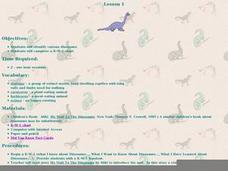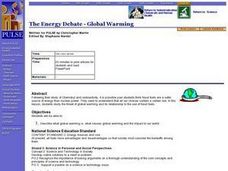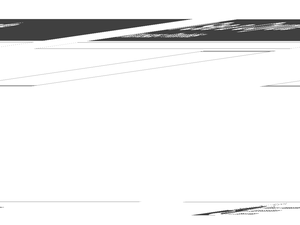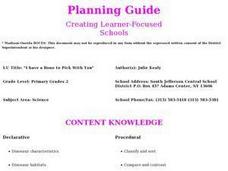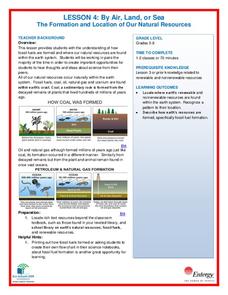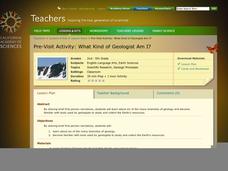Curated OER
How Big is a Dinosaur?
Fourth graders create enlarged replica of a stegosaurus drawing, using a grid to practice coordinates.
Curated OER
Carbon Dioxide - Sources and Sinks
Where does all of the carbon dioxide come from that is supposedly leading to climate change? Earth science pupils test animal, plant, and fossil fuels as sources in this investigation. Using an indicator, BTB, they are able to detect the...
Curated OER
The Third Location and Millennium Wall Exercise
In this third location and millennium wall exercise worksheet, students sketch the fossil in a given diagram. Students use their imagination to sketch what the animal may have looked when it was alive.
Curated OER
In the Wild
Third graders examine the concept of ecology and how animals are suited to their habitats. For this animal adaptation lesson, 3rd graders identify a variety of plants and animal species that live in a Beech forest.Students create a food...
Curated OER
Pollen Tracks
Students participate in an artificial dig investigating imitiation rock samples that contain "pollen" from ancient plants. Students determine which plants the pollen samples came from.
Curated OER
What is Deforestation?
An overview of deforestation is the focus of this resource, which present the reader with a list of facts. Ten comprehension questions follow; learners can write their answers on a separate piece of paper. Have your environmental...
Green Learning
Build Your Own Biogas Generator
Where this is not exactly a lesson plan, it is a terrific outline of how to generate biogas from an animal manure sample. If you are up for the challenge, the generator can be built by your class as a concluding project at the end of an...
Curated OER
Identifying Dinosaurs
Students investigate basic information about dinosaurs. They listen to the book, "My Visit To the Dinosaurs," explore various websites, take an online quiz, and play an online dinosaur game.
NOAA
Climate Is Our Friend…Isn’t It?: Make an Extinction Polyhedron
Climate affects populations in different ways. Scholars research extinct organisms and mass extinctions in part three of the 10-installment Discover Your Changing World series. They create graphic organizers, then fill in the...
American Museum of Natural History
Ask a Scientist About Dinosaurs
Who doesn't want to know more about the mysterious dinosaurs? Learners read about dinosaurs and the process scientists use to continue learning more about the animals in an interview-type format. A paleontologist responds to submitted...
Curated OER
The Energy Debate - Global Warming
Students describe what global warming is, what causes global warming and the impact to our world. They study the threat of global warming and its relationship to the use of fossil fuels.
Curated OER
I See a Coyote
Learners role-play coyotes looking for natural resources. In this natural resources lesson plan, students examine the relationship between animal life and the environment. Learners play a game that demonstrates how natural...
Curated OER
Creating New Forms of Life
High schoolers are asked to use their imaginations to take the idea of biotechnology one step further. Before beginning this activity young scholars read and complete a report on the book "Jurassic Park," which deals with the use of...
Curated OER
Dino Dung!
Students examine how there is more to poop than they think! After reading through material, they answer a series of questions on coprolite, and explore the diet and physical attributes of dinosaurs, as well as their environment.
Curated OER
Dinosaurs
For this earth science worksheet, students match each vocabulary term, that names something specific related to earth science, with its correct description found in the right column. They identify different types of scientists and...
Curated OER
World of Dinosaurs Game
In this science worksheet, learners write each of the vocabulary terms that relate to earth science listed in the spaces of the bingo card provided. Then they use the clues at the bottom of the sheet to match to its correct science term...
Curated OER
Combustion Reactions
Pupils write a balanced chemical reaction. They articulate how burning fossil fuels increase the carbon dioxide levels in the atmosphere. Students incorporate all the environmental risks involved as well.
Curated OER
Plants of the Past
Fourth graders explore ecosystems by examining plants of the past. They discuss ways in which we interact with plants in our daily lives. Students discuss the role plants play in providing food for animals and the significance they had...
Curated OER
The Great Continental Drift Mystery
Students stud the concept of Pangaea by using Wegener's clues to construct a map of the continents joined together. They determine how fossil distribution can be used to enhance the study of continental drift. They locate the...
Curated OER
I Have a Bone To Pick With You
Students explore fossils and how they are found by paleontologists.
Curated OER
Cell Structure and Function
Students discuss scientific advances brought about by the Mars Surveyor Space Program which impact on daily life, identify laboratory apparatus like microscopes, slides and coverslips, and use the microscopes to view cells and organisms.
National Wildlife Federation
By Air, Land, or Sea: The Formation and Location of Our Natural Resources
Coal forms from the ancient remains of plants that were alive on Earth before the dinosaurs! Scholars use their t-charts from the previous lesson over resources and research to determine if their information is correct. Through analysis...
California Academy of Science
What Kind of Geologist Am I?
Transform your class into young geologists as they learn about six different branches of geology. Using the included geology career descriptions and picture cards, learners work in small groups deciding which tools and locations fit...
California Academy of Science
Composting: A Scientific Investigation: California Academy of Sciences
Garbage, recycle, compost: Does it really matter where we put our trash once we are done? By making detailed observations over seven weeks, kids will see which materials break down naturally to become a healthy part of the soil, and...









